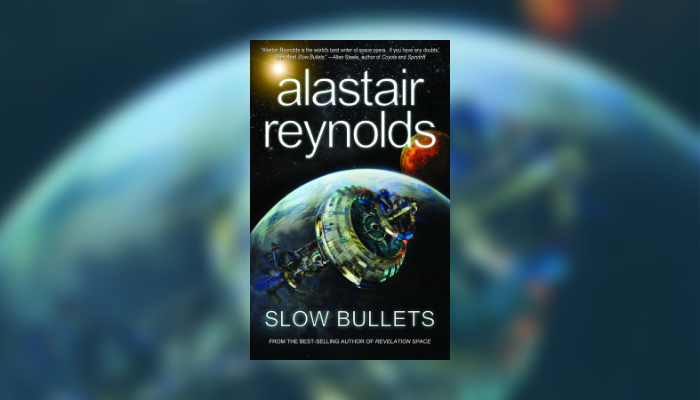|
Prolific author Alastair Reynolds is a major presence in the British science fiction scene, best known for his expansive Revelation Space universe which he has published since 2000. For its part, Slow Bullets is a standalone novella which exists outside Reynolds' various fictional universes - instead focusing on the unfortunate passengers of the "skipship" Caprice. Formerly a luxury liner, the vessel has been retrofitted as a prison transport in the aftermath of an interstellar conflict between factions of humanity. Outside of a limited number of civilians, the Caprice mainly carries the "dregs" of the now-ended war: military criminals of all kinds, drawn from both the Central and Peripheral sides. The novel is narrated in the first person by Scur - a young woman who had been mistakenly recruited into the war, captured by a sadistic enemy soldier immediately after the ceasefire, tortured, and left for dead. Much later, she wakes up from suspended animation aboard the Caprice and together with a crewmember, realises that the vessel's journey has gone disastrously wrong.
In order to keep Slow Bullets to novella length, Reynolds dispenses with all but the most strictly necessary description which results in a very quick read. Those who want extended treatises on how the Caprice operates, the psychologies of the characters or the mechanics of the Central-Peripheral war will come away disappointed. Reynolds' goal is to tell a story, not build a whole world - and in this he largely succeeds. The crisis in which Scur and her impromptu shipmates find themselves is not a wholly original one, but Reynolds works all the ramifications of the disaster into his tale. As a main character, Scur doesn't actually *do* very much as an individual but is more the chronicler of the Caprice's history. While the characters often lack much agency, the situation keeps changing and new ideas are continually introduced - moreso than you might expect in a novella. While it has a slightly underwhelming ending, Slow Bullets packs a lot of dynamic plot and some intriguing ideas into a very concise format. On those terms, and as an accessible introduction to the work of a prolific writer, it's a book that is quite easy to recommend.
0 Comments
Your comment will be posted after it is approved.
Leave a Reply. |
About
Exploring classic science fiction, with a focus on the 1950s to the 1990s. Also contributing to Entertainium, where I regularly review new games. Categories
All
|

